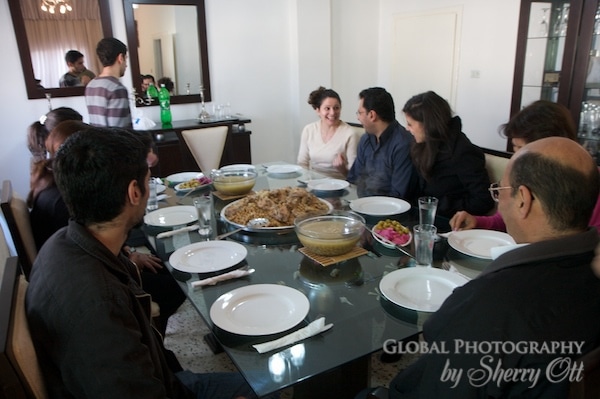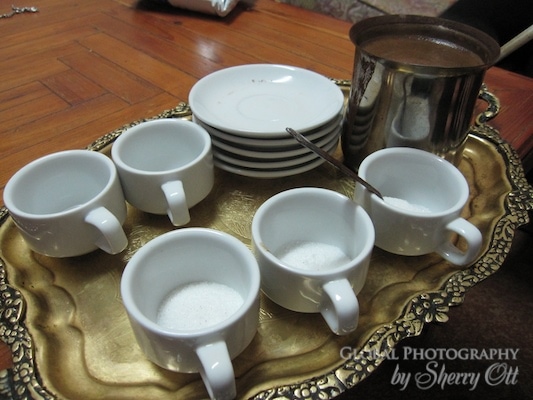Middle Eastern Visitation Rights
This article may contain affiliate links where I make a small commission for purchases you make from links that you click from this article. By purchasing through these links, you support me at no additional cost to you. Thanks for your support.
I sat on the formal couch and listened to the Arabic words swirling around me; lightening fast and coming from every direction. I looked at the people surrounding me and took note of their gestures and facial expressions. I tried to piece together the puzzle of what was being said, but I knew that was impossible.
Instead, I amused myself by simply making up a conversation in my head; I imagined what they were talking about in such a passionate fashion. I was directing a soap opera in my mind, slightly amused by my own imagination; then my dramatic world was interrupted as English words brought me back to reality. I looked around the room and everyone was looking at me in anticipation that I would answer. “Yes, I’d like more coffee,” I replied.
This was a scene I encountered daily in Jordan and Lebanon. The scene was always set in a ‘receiving room’, with little cups of Turkish coffee on the table. This process was the one thing that was for certain in the Middle East…visiting would occur daily.
I was prepared for desert, for camels, for drinking tea; but I wasn’t prepared for the hours of time I would spend sitting and visiting with people in the Middle East. Quite frankly, I don’t think most tourists would really experience this side of the Arabic culture which is an important process to maintaining family and community ties. However, because I was living with locals in both Jordan and Lebanon, I found myself thrust into the local pastime of talking.
Table of Contents
The Visitation Process
While in Jordan each day Etidal, my host mom, would ‘accept’ a couple of visitors for coffee and visiting. The neighbors or a family member would stop by, and Etidal would run and make some coffee or tea and then we’d all sit on the couch and talk. Actually, I would just listen to the swirl of Arabic around me unless of course the guest knew a little English and then I could be a part of the conversation. The only multi-tasking going on was drinking coffee at the same time; there was no distracting television, music, computer, or cell phone…just the simplicity of a few people sitting and talking.
In the evenings Etidal would put on her nice shoes, get cleaned up, and ask me if I wanted to join her and the other family members. “Where are you going?” I’d ask.
“To see my sister/mother/brother/family friend.”
I’d consider it for a bit and think if I were home there is no way I would go waste my time with this. However I wasn’t home, and I wasn’t sure if I could even say no. Since most of the family went with her, I felt somewhat obligated to accompany them as ‘part of’ the family. Normally I would close my laptop, put on my shoes and join them. After all, I knew it would be a cultural adventure even though I may not understand the whole conversation. It was in these numerous conversations I learned about the real Arabic culture, politics, religious views, dating, romance, and gossip of the country or city.
Visiting Etiquette
There was an etiquette to visiting. If you were visiting someone you weren’t as close to in friendship, then no doubt you’d be ushered into the ‘receiving room’ which was closer to the front door and much more formal. The good china would often be used to serve tea to guests who weren’t as well-known, and the whole atmosphere of visiting was a bit different; more formal. However, if you were family or good friends, then you were able to be more casual. You were brought deeper into the home into the family room. Tea and coffee were still offered, but the everyday cups were used and it took on a really relaxed atmosphere.
Discover the food of Lebanon
In Lebanon the same etiquette to visiting occurred – there was a formal room to receive lesser-known guests, and a family room to receive close friends and family. In addition, in both countries, it was necessary to always have something more formal to serve as a treat with your coffee/tea. I remember one time when Mira, my host mom in Lebanon, was talking about how relieved she was that she had some chocolate cake on hand as she had a surprise visitor show up and had to have something nice to serve him.
I asked her what would have been the consequences if she hadn’t had cake to serve him and she responded that it would have been “terrible”. I tried to probe more and basically got an answer that she would be considered cheap or not a good hostess if she hadn’t had the proper snacks to serve. Visiting is serious business and has serious social consequences.
Deciphering the codes
However, how does a foreigner who doesn’t speak Arabic really understand what is going on in such a situation? It was actually quite easy. First I understood the relationship of the visitor to my host family immediately as soon as the visitor was ushered into either the formal room or the family room. Then as soon as Mira walked in with a tray of good china and herbal tea it told me more about her relationship with the guest. If there was cake offered/served that told me even more. When the speaking began, I became very good at reading body language.
I watched people intently and caught a few words here and there and could sometimes piece together conversations. Often my host family would stop and explain a bit to me – at least enough of the puzzle pieces to put together an understanding of the conversation along with the body language. Sometimes though I would zone out and simply make up my own stories; imagining I knew what they were speaking about.
Is Visiting a Lost Art?
I came to really enjoy the visiting process. After a month, I started to long to have relationships like this, which were frequent, in-person, focused, and close. But quite frankly, this concept of visiting is a dying art in America. It still exists in some parts of the States, and with certain generations (like my parents), but it’s dying. It’s being killed by our constant need to multitask and have relationships with our electronic devices rather than sitting with real people.
I can’t really remember a time when I had a surprise visitor show up at my apartment door. First of all, they definitely would have texted me first to let me know they were coming. There are few surprises in this digital world any longer. Our visit takes place on Skype or a chat room, or simply through a series of text messages with shortened words and cryptic abbreviations.
In this world of high-tech communication, it seems old-fashioned and silly to sit and simply talk for an hour or two. I am so used to multi-tasking that I find sitting and talking to be a bit boring; at least I used to think it was boring. The Middle East changed my thoughts on the process. Granted, I don’t think I’m ready to convert my weekends to visiting cousins and friends completely, but something a bit more focused and regular would be nice.
Visiting in the Middle East seemed to build a strong family bond and further, the idea that families must take care of each other. This is one of my favorite things about traveling – seeing how families operate and interact around the world. And the coffee and cake weren’t bad side benefits either!
What do you think, is visiting a lost art?










While I’m sure social media bears some responsibility, I think this custom began dying in the States well before the Internet even existed. I think it has more to do with the more transient nature of our society in recent generations. Speaking as a female who was a single parent for over a decade, and one who moved frequently during that time, my friends and I tended to hang out together by going out – restaurants during the day and bars/nightclubs at night. Only the absolute closest friends and family visit for extended periods of time in each others’ homes.
However, now that I find myself back in my hometown for a period of several months, I see that even here people are often calling before coming over. It’s mainly just to see if someone is home before stopping by, and it’s easier now that you can call from cell phones if you happen to be in the neighborhood. But still, in a place where people are often related to half the population of the area, I was surprised to find this to be the case.
Of course, there are still members of the oldest generations who feel perfectly at ease just dropping in. But I have to say…
I hate that.:)
Oh, and I wanted to add that I find these glimpses into other societies absolutely fascinating. I would *never* be comfortable living in the homes of strangers. I’m not sure I would actually be comfortable staying in anyone’s home for longer than a few days, maybe a couple of weeks with family. It’s why I don’t think I could couchsurf. But I do recognize the value of the experiences. And you describe them wonderfully.
Thanks so much for your kind comments! Yes – it is a bit weird and challenging living with others – but I’m used to it after 4 1/2 years!
I don’t know if visiting is a lost art. I never experienced visiting like this even as a kid. I like the idea of it, like you, while I’m away but I’m not sure that without having grown up in that manner I would have the stamina to do it all the time like they do. What a great look into the culture though. Thank you.
yes – it does take stamina! I asked one of the older sons if he did this every weekend and he said yes and that it can be quite exhausting since he works full time and sometimes would like his weekends more free. Yet he had these family obligations to fulfill.
I really love the sense of community and family still celebrated by other cultures and especially in Arab cultures.
Thanks for posting this. I wish we could enjoy this visiting more in the US!
I had to chuckle at your comment about a soap opera going on in your head 🙂
Ha – what can I say – I have an active imagination!! Glad you liked the post!
Hey Sherry – cool post! We have just recently started following your blog while we plan our own RTW trip…so far it has been very informative and entertaining…thanks for that 🙂
Just a question, and perhaps this is in your blog and I have missed it, but how did you come to live with these families? Sounds like an awesome experience….!
Hi! So happy you found my website and glad it is useful to you. I actually was living with the local families through a cultural exchange program I did from GeoVisions. The do this really cool conversation Corps programs around the world where you live with local families and pay for room and board – but I found it to be quite reasonable. Here’s teh website – http://www.geovisions.com Take a look and let me know if you have any questions. Also – since you are planning a RTW trip – make sure you check out my other sites -www.meetplango.com and http://www.briefcasetobackpack.com – both are geared towards mid-career professionals who are planning extended travels. If you are located in one of our Meet Plan Go cities – then we host travel meet-ups so that you can meet other like-minded travelers in your area! Please let me know if I can be of any help!
Hey Sherry. GREAT post. I didn’t know that Middle Eastern people had such hospitality and closeness to one another. And sadly, I’d have to agree with you that visitation is a dying art in America. I think it’s a matter of knowing what’s important in life and technology is masking these things.
When I was just a boy in the 1940s this was our way of life also in the western midwest of USA. My mom always had to have some cookies, cakes, etc “just in case someone came to visit”, she said. The visitors could be relatives, neighbors, or friends. It was our entertainment in those years as we could not afford much else, and it was a way of getting the latest news. Like you I enjoyed these visits, and yes it is a dying art as you pointed outfor all the reasons you mentioned. We still do some of that out here in the country.
DAD
Yes – I know that you and mom still visit…but probably not the the extent that you did on the farm as a boy! My time in the middle east did really make me appreciate it – mainly becuase it made me slow down and stop multi-tasking for a little bit. It was a relief!
Very interesting to read. I once spent a lot of time with a Kosovo Refugee, her family had a similar culture, and I was always offered Turkish Coffee or Russian Tea and invited into the family room to talk when I visited.
I try to offer similar hospitality at home, always keeping a bottle of scotch handy. But like you say, I’m never caught off guard by a surprise visit, and I’m lucky to have someone stop by more than once a week.
It seems the norm here is to go “out” to visit, where you are constantly distracted by a movie, or waitress, or loud music.
Absolutely Mike – we are much more likely to ‘visit’ around another activity out in public – dinner, bar, movie. But quite frankly I kind of prefer the middle eastern way – it feels much more focused and personal.
Nice article. Visiting was also the thing to do in Chile. Fortunately, when I moved back to the states, my family are all huge *visitors*…..I mean they all still do lunch together every Sunday and sit around the table and visit. You don’t realize small things you should be thankful for until you visit the rest of the western world and we forget how to communicate outside of 140 characters! 🙂
This is one of the main reasons why I love traveling – it really pushes your own culture boundaries. I really came to love the visiting process in the MIddle East and now miss it!
I think the importance of visitation and connections reveals an even more important truth about Middle Eastern culture, which is the emphasis on family and friendship. I have talked to a lot of arabs who came to live in the US and were frusterated because they couldn’t seem to make what they considered any close American friends. For them, a friend meant someone they can rely on for anything at any time of day or night through the bad and good. In fact, it seems that the US is the odd man out in world cultures in terms of the importance of family and relationships. I have seen the closeness of families in many cultures including those of Latin America as well as the Middle East, where families almost always stay living in the same cities with their relatives. I guess it’s a different way of doing things in which community takes priority over independence.
You bring up a great point – American culture is about independence…it runs deep within each of us. Maybe that’s why it so hard to really connect with our families at times – becuase we are taught to be independent from the point where we turn 18. Thanks for reading – it was great to see your comments and thoughts!
While living in New York I had lots of arab friends and neighbors and when they did stop over to visit it was always a surprise (nice one for that matter). My partner who´s lebanese himself always offered tea or coffee and would struggle to get something sweet to go with it, reading this post took me back to that time and man do I miss it!
Yes – I really grew quite fond of the process while I was there – even though it was really strange to me at first. Now I miss it!
While I’m not of Middle Eastern descent, I was raised in a “visiting” family. When I was growing up, visiting was more of a weekend thing. Saturdays were for visiting friends. Every Sunday was for family and extended family visits. Visiting for us could include just hanging out and talking, Sunday picnics/meals, or watching tv/sharing music, playing games together or all of the above. I’ve also experience the art of visiting in France.
It is a lost art in the US, and I think it’s a sad art to lose. I know I’ve stopped inviting people over because no one knows how to just sit down and relax. It really gives me a sense of losing my community.
Most definitely a dying art. The process of hanging out and enjoying other people’s company (in person!) is something more people should appreciate. It’s amazing how relaxing slowing down a bit can be…with tea or coffee of course 🙂
Yes – I really learned to appreciate it when I was there – wish it were more prevalent in the US.
I can totally relate to this post 🙂 I’m american but married an Arab (Palestinian) and when we visit my in-laws there’s visits and visitors and they’re all speaking Arabic while I sip tea and wonder what theyre saying lol. I have learned a lot of basic words though and my in-laws know some basic English so that helps. But yeah it seems to be lost in the US unless you’re going to a formal dinner for holidays or for a BBQ. I miss chatting with people in person instead of via text/email/phone lol.